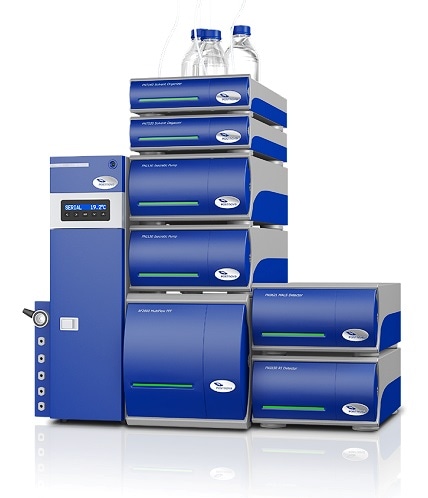Postnova Analytics reports on a recent independent review which details how Asymmetric Flow Field Flow Fractionation (AF4) is a valuable technique to improve the quality of nanoformulated medicines.

Currently, only a few standardized methods exist to characterize some of the crucial physicochemical properties and their impact on biological systems of medical nanoparticles. Unfortunately, they are often not applicable to the more complex and innovative nanoformulations.
Particle size and size distribution are key factors for the manufacturing quality, as well as the efficacy and safety of medicinal nanoparticles. Despite its widespread usage in the nanomedicine field, batch-mode dynamic light Scattering (DLS) is generally only considered a ‘low-resolution’ method for checking the integrity of monodispersed samples. To overcome the inherent difficulties that are imposed when analyzing a polydisperse nanoformulated sample by DLS, a fractionation step should be incorporated prior to measurement. This can be done by using DLS and MALS detectors coupled online to a Postnova Analytics Asymmetric Flow Field Flow Fractionation (AF4) system.
In the independent report the authors describe how the USA Nanotechnology Characterization Laboratory (NCI-NCL), and more recently the European Union Nanotechnology Characterization Laboratory (EU-NCL), have developed standard operating procedure (SOP) to determine medicine nanoparticle size distribution by coupling AF4 with on-line size measurement (DLS and MALS). They state how the AF4-MALS-DLS technique as applied to medicine nanoparticle characterization might be considered as an alternative to the DLS alone for regulatory purposes.
This SOP was successfully applied by the EU-NCL consortium to characterize pristine medicine nanoparticles with the aim to resolve the particle size distribution of complex mixtures and discriminate between population of particles with different shapes. In addition, the SOP was used to discriminate between larger particles and small aggregates, and to monitor small changes of particle size distribution due to batch to batch variability or instability during long-term storage, all cases where batch-mode DLS fails. In addition, the EU-NCL also developed an SOP to study the nanoparticle behaviour in presence of serum proteins, which is crucial to understand the biological effects of medicine nanoparticles in vitro and in vivo.
The Postnova AF2000 is a high-performance Asymmetric Flow Field-Flow Fractionation (AF4) platform for separation of nanoparticles, macromolecules and proteins in complex matrices such as pharmaceutical formulations and foodstuffs. Modular in design, the AF2000 incorporates the combined experience, expertise and technological advances from Postnova Analytics' two decades of leadership in FFF. Incorporating a range of FFF modules in a single integrated system to provide universal separation, the AF2000 offers more flexibility, better performance and more robust results than any system before.
Source: http://www.postnova.com/